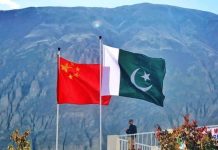WASHINGTON: US President Joe Biden predictably used his first multilateral appearances since taking office to rally support from allies to confront China, but faced a wall, as cooperation with China is inevitable for Europe to tackle the COVID-19 pandemic and other challenges and using “ideology” to glue the alliance together is losing its attraction.
In a speech to the virtual G7 summit, Biden stressed the need for US and allies to collectively deal with economic threats posed by China. At the Munich Security Conference, Biden said “We must prepare together for long-term strategic competition with China,” and vowed to restart multilateralism after four years of “America first” policies. “I know the past few years have strained and tested our transatlantic relationship, but the United States is determined – determined – to re-engage with Europe, to consult with you, to earn back our position of trusted leadership,” he said. He told the virtual online audience: “America is back.” However, Biden’s calls did not gain much traction among US allies in Europe. That was clear in a joint statement following the G7 meeting, which focused on tackling the real challenges stemming from the COVID-19 pandemic and economic recovery and noticeably only mentioned China once – in favorable terms.
“With the aim of supporting a fair and mutually beneficial global economic system for all people, we will engage with others, especially G20 countries including large economies such as China,” the statement reads.
The leaders did say that they would consult with each other on collective approaches to address non-market oriented policies and practices, which some foreign media outlets claimed to be a reference to China. While the statement did not directly reveal a pushback from allies against Biden’s attempt to pit Europe against China, speeches by European leaders were notably straightforward in their disinterest in a confrontation. German Chancellor Angela Merkel called for a common approach toward dealing with China but she also noted the interests between trans-Atlantic nations don’t always line up.
– The Daily Mail-Global Times News exchange item






